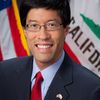Richard Pan recall, California State Senate (2019-2020)
| California State Senate recall |
|---|
| Officeholders |
| Recall status |
| See also |
| Recall overview Political recall efforts, 2019 Recalls in California California recall laws State legislative recalls Recall reports |
An effort to recall Richard Pan, a member of the Democratic Party, from his elected position representing District 6 in the California State Senate was launched in May 2019. The recall petition was approved for circulation on August 26, 2019.[1] Supporters of the recall needed to collect 61,224 valid signatures by February 3, 2020, to move the recall forward. No signatures were submitted at the deadline.
Pan was targeted for his support of a bill that restricts vaccine medical exemptions. He was the lead sponsor of Senate Bill 276.[2] Gov. Gavin Newsom (D) signed the legislation on September 9.[3] Pan was targeted for recall in 2015 over his support of mandatory vaccinations. Supporters of the recall did not submit signatures before the deadline.[4] Read more on that recall effort here.
Pan was elected to District 6 in the state Senate in 2014. He was re-elected in 2018 with 69.5% of the vote.
Recall supporters
The recall against Pan was filed by Austin Bennett and 76 others in Sacramento and Yolo counties on May 29, 2019.[5] The petition read, "You are hereby charged with high treason for betraying your oath to defend and protect the U.S. and state Constitution."[2] According to The Sacramento Bee, the petition "also alleges Pan disregarded the dangers of vaccines and violated a physician’s Hippocratic Oath to 'first do no harm.'"[2]
Bennett was cited for misdemeanor assault on August 21, 2019, after he shoved Sen. Pan on a sidewalk near the capitol building.[6] In December 2019, Senator Pan was granted a restraining order against Bennett.[7]
Recall opponents
After the recall was announced against Sen. Pan, he said, "This recall attempt falls into the same pattern of intimidation and harassment that families and doctors who stand up for public health face repeatedly. Antivaxxers failed to recall me in 2016 and attacked me during my re-election for state Senate last year. I am grateful to the people of my district who supported me because they understand that I am working hard to keep people safe and healthy."[2]
Path to the ballot
- See also: Laws governing recall in California
The California Constitution gives citizens the right to recall state and local officials. To recall a state official, proponents must first file a notice of recall with the California Secretary of State. This notice must have the same number of signatures that are required to file to run for the office that is targeted in the recall. Proponents must also notify the official they seek to recall of their intent.
Once the filing has been completed, proponents have 160 days to circulate the recall petition and gather the necessary signatures to trigger an election. For state legislators, proponents must gather the number of signatures equal to 20 percent of the total votes cast in the last election for the office. County officials certify the number of signatures collected and submit the results to the secretary of state. If the number of signatures is sufficient, the secretary of state submits the results to the governor. The governor publishes a notice for a recall election within 60 to 80 days, provided that there are at least 180 days before the next regularly scheduled election in the jurisdiction. If there are less than 180 days before the next regularly scheduled election, the recall election will be consolidated with the scheduled election.[8]
Ballots in the recall election have two components. The first component asks whether or not the official should be recalled. The second component allows voters to select a candidate from a list of replacement candidates. If a majority of voters agree to recall the official, then the replacement candidate with the most votes wins the office. Voters can select a replacement candidate even if they voted against recalling the incumbent.
Supporters of the recall needed to collect approximately 61,224 valid signatures by February 3, 2020, to force a recall election.[2] No signatures were submitted by the February 3 deadline.
Election history
2018
- See also: California State Senate elections, 2018
General election
General election for California State Senate District 6
Incumbent Richard Pan defeated Eric Frame in the general election for California State Senate District 6 on November 6, 2018.
Candidate | % | Votes | ||
| ✔ |  | Richard Pan (D) | 69.5 | 212,903 |
 | Eric Frame (Independent) | 30.5 | 93,217 | |
| Total votes: 306,120 (100.00% precincts reporting) | ||||
 = candidate completed the Ballotpedia Candidate Connection survey. = candidate completed the Ballotpedia Candidate Connection survey. | ||||
| If you are a candidate and would like to tell readers and voters more about why they should vote for you, complete the Ballotpedia Candidate Connection Survey. | ||||
Do you want a spreadsheet of this type of data? Contact our sales team. | ||||
Nonpartisan primary election
Nonpartisan primary for California State Senate District 6
Incumbent Richard Pan and Eric Frame defeated Janine DeRose and Jacob Mason in the primary for California State Senate District 6 on June 5, 2018.
Candidate | % | Votes | ||
| ✔ |  | Richard Pan (D) | 65.9 | 109,907 |
| ✔ |  | Eric Frame (Independent) | 13.2 | 22,062 |
 | Janine DeRose (L) | 11.0 | 18,308 | |
 | Jacob Mason (D)  | 9.9 | 16,458 | |
| Total votes: 166,735 | ||||
 = candidate completed the Ballotpedia Candidate Connection survey. = candidate completed the Ballotpedia Candidate Connection survey. | ||||
| If you are a candidate and would like to tell readers and voters more about why they should vote for you, complete the Ballotpedia Candidate Connection Survey. | ||||
Do you want a spreadsheet of this type of data? Contact our sales team. | ||||
Historical state legislative recalls
Ballotpedia tracked 140 recall efforts against 133 state lawmakers from 1913 to 2019. During that time, 39 recalls made the ballot and 22 state legislators were successfully recalled.[9]
Michigan led the way with 36 state legislative recall efforts from 1913 to 2019. Of those 36 recall efforts, three were successful. Wisconsin followed with 30 state legislative recall efforts. Six of those recalls were successful.
See also
- Recall campaigns in California
- Political recall efforts, 2019
- Political recall efforts, 2020
- State legislative recalls
- Richard Pan recall, California State Senate (2015)
External links
Footnotes
- ↑ California Secreaty of State, "RECALL OF STATE SENATOR RICHARD PAN, STATE SENATE DISTRICT 6; CALENDAR OF EVENTS," accessed August 30, 2019
- ↑ 2.0 2.1 2.2 2.3 2.4 The Sacramento Bee, "Vaccine skeptic files recall petition against California senator," June 14, 2019
- ↑ KPBS, "Newsom Signs Controversial Vaccine Bills Aimed At Curbing Fraudulent Medical Exemptions," September 9, 2019
- ↑ The Sacramento Bee, "Richard Pan recall effort falls short on vaccine issue," January 4, 2016
- ↑ California Secretary of State, "Current Recall Efforts," accessed June 17, 2019
- ↑ Radio.com, "Anti-Vaccine Activist Cited for Misdemeanor Assault after Shoving CA Lawmaker," August 22, 2019
- ↑ CBS Sacramento, "Sen. Richard Pan Granted Restraining Order Against Anti-Vaccine Activist," December 12, 2019
- ↑ California Secretary of State, "Procedure for Recalling State and Local Officials," accessed May 4, 2017
- ↑ National Conference of State Legislatures, "Recall of State Officials," accessed August 13, 2021


